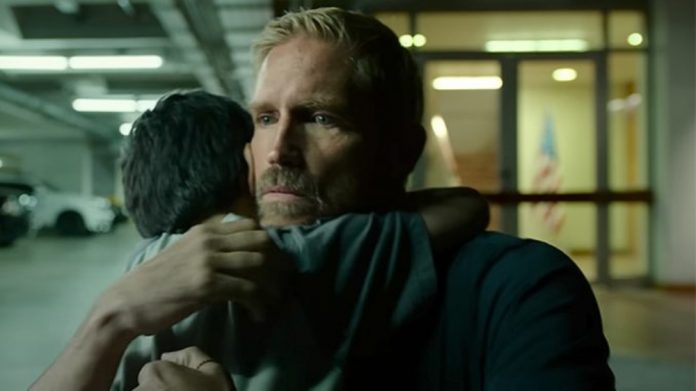“How does it feel giving QAnon a platform?”
That was one of the ridiculous replies I received when I announced on Twitter that I’d interviewed Sound of Freedom director Alejandro Monteverde, and it was precisely why I wanted to interview him.
Based on a true story, Sound of Freedom stars outspoken actor Jim Caviezel (The Passion of the Christ) as Tim Ballard, a now-controversial former CIA agent who embarks on a personal mission to rescue children from sex traffickers in Colombia. For the past two months, whenever Sound of Freedom has come up in my circles, people have called it “that QAnon movie” even though they’ve never seen it, nor has most of the media writing about the film, which isn’t really “faith-based,” either, not that being “mislabeled” has hurt it at all.
On the contrary, Sound of Freedom has grossed $175 million at the domestic box office on a reported production budget of just $14.5 million, making it the sleeper hit of the year despite arriving in theaters as an overlooked underdog on July 4, where it was sandwiched between Indiana Jones and the Dial of Destiny and Mission: Impossible – Dead Reckoning Part One. With that kind of timing, you’d think it would be all but doomed at the box office, but instead, Sound of Freedom did the unthinkable by outgrossing both of those blockbusters domestically, with an international release still to come. And as Monteverde points out below, exclusionary marketing terms like “faith-based” don’t exist in other parts of the world, where the film will soon be released.
And yet, despite its astounding success here in America, Sound of Freedom has taken a pounding online for seemingly no good reason, as far as I can tell, though I’ll admit I’m not attuned to all the latest conspiracy dog whistles making the rounds these days. All I know is that the whole point of journalism is to give a voice to the voiceless, and though Monteverde has been making the rounds of late — he spoke to Variety, the Hollywood Reporter, and the Los Angeles Times in addition to Above the Line — he has been ascribed all these sinister political motivations that couldn’t be further from the truth, so I wanted to give him a chance to set the record straight.
In the below interview, Monteverde explains the genesis of Sound of Freedom and how Angel Studios helped spread the word, making it the year’s single-greatest success story next to Barbie. With the director eager to spread the word about child trafficking in the hopes of ending it once and for all, don’t be surprised if there’s a sequel…
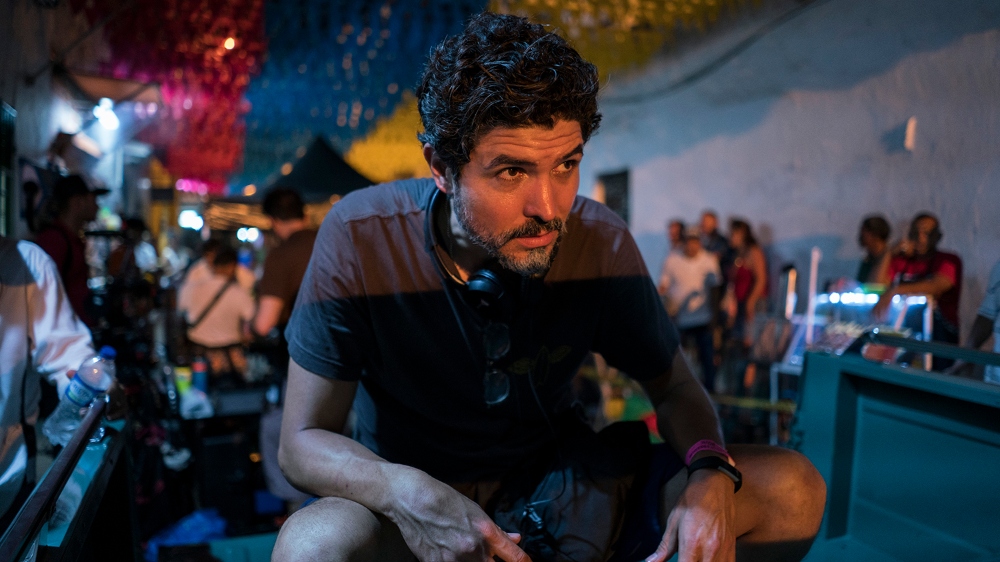
Above the Line: I owe you an apology, Alejandro, as I said on my podcast that this movie was likely playing to empty theaters despite the box office grosses, and then when I went to see the movie late on a random weeknight, it was packed. So my question is, do you feel like the media has given you guys a fair shake or have they not given you enough credit for what’s happening here?
Alejandro Monteverde: I do think that everybody jumped to conclusions too quick, and I don’t blame anybody. There was a phenomenon to this, coming out on the 4th of July and all of a sudden having that box office against Mission: Impossible and Indiana Jones, so it took everybody off guard.
And I did the same thing as you did, I went to a couple of theaters, and I got the worst seat in the house, which is in the front, and I was in the front looking up at the movie, and then I realized the theater didn’t have A/C and the sound wasn’t sounding very good, and I [guess] there was a technical problem on our end, but the theater was packed, and then I was like, ‘Wow, what is happening here?’ And then I went to another screening in a better theater, and it was the same situation — packed.
And then I started getting texts, which was really interesting because you know, throughout your years — 20 years — you make friends, and a lot of your friends, you don’t tell them what you do, right, because that’s the beauty [of the friendship]. Unfortunately, with a lot of people, the first question is, “What do you do?” In this case, it wasn’t the case, and they didn’t know I made Sound of Freedom.
And what the weirdest thing [was], I got a text from a friend [who] I hadn’t seen in 12 years, and it said, ‘Hey man, you should go see Sound of Freedom.’ And I was like, ‘Wow, he doesn’t even know I made it.’ So, people don’t look at the credits. [But] yeah, it’s been a phenomenon, and yes, I was surprised and a little heartbroken [about] how the movie was positioned in the beginning and continues to be. It has been a rollercoaster.
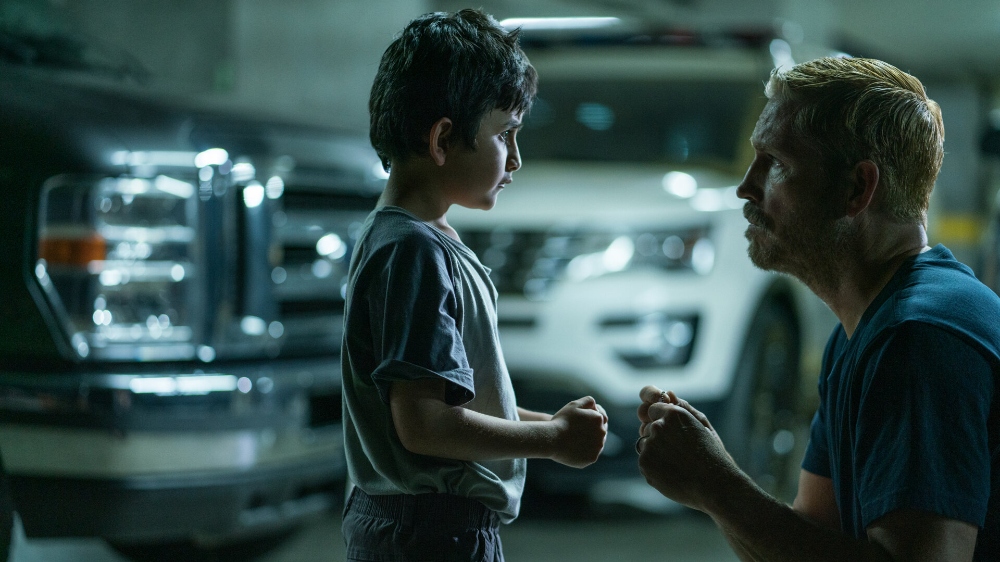
ATL: How do you feel that the media has mischaracterized this movie? What are they saying about it that makes you go, “Wait, that isn’t true?”
Monteverde: Well, for example, the other day, because I don’t have social media — I don’t have Instagram, Facebook, or Twitter, I don’t have anything, so I was kind of [shielded] from everything, but friends of mine or producers were constantly sending me links, though I couldn’t open the Instagram links because if you don’t have an account, you can’t open them, but on TikTok, I was able to see some of the reactions and I was completely taken aback by how quickly people jumped to label the film.
I was like, ‘Wow, I’ve seen films where people are dressed like priests, like Silence by Martin Scorsese, and I’ve seen films like Million Dollar Baby, where the character goes and always looks for advice from a priest, and they actually talk about God for, like, 10 minutes, and those are not called faith-based, so how did this film get that label?’ And then I said, ‘What kind of faith?’ Because there are all kinds of faiths. Muslims? Buddhists? Christians? I think Christians are separated, and I’m Catholic. So how did we get that label?
And then all of a sudden, we continued to be labeled, like all of the audience belongs to one side of the spectrum, politically. I’m like, ‘Well if you look at all the movies, you cannot reach close to $200 million dollars in box office with one… If it’s not bipartisan, you don’t get to those numbers. It’s impossible. So it crossed over to the bipartisan big time, because all of my friends are more on the opposite side of the spectrum of what the movie has been labeled, and all my friends went to see it, and not because of me — they were literally getting emails from their uncles and so on, and we’ve been getting incredible support from our brothers in the Jewish community — amazing support from the Jewish community — so how could this be labeled as [faith-based]?
And I understand that some people, given the movie’s themes, feel that by going into political events and things like that… it’s like, for me, I always say that “politics divide,” I stay out [of] anything that is politics, I will not go to anything that is political, like a screening. I don’t care who’s watching the movie, I’m not going to go. [But] I believe in the [power of] art to create social dialogue from every point of view, those are the kinds of movies I like to make, and [with] this movie, it’s important that we begin a social dialogue — not about what did happen in the movie or what did not happen in the movie. I didn’t make a movie about that.
I made a movie to shine a light on human trafficking and especially focus on child trafficking. And I started writing one thing that I want to clarify because nobody has brought it to the foreground, [which] is, “What was the motive for making this movie?” And that, to me, is one of the core elements of this whole chaotic grounds that we’ve found ourselves [on] with this film.
Because the way that this movie came to life, it was around seven or eight years ago, and it was a time when we didn’t have iPads and Netflix and all of that stuff, you know? Netflix was still [all about] Blu-rays and DVDs, and I remember used to record everything. I used to record my shows and come home late at night after work and after writing, and I’d watch these shows, and it was one of three shows that I saw. It was either 20/20, Dateline NBC, or 60 Minutes. Those are my favorite shows and I would record them and catch up with them. I literally can maybe say I’ve seen every one. They’re good to go to sleep with.
I saw a piece on one of those three shows, it was a short piece, I remember, but very impactful, about [the] sexual exploitation of children. At that time, they were calling it child pornography. And then they tap a little bit into child trafficking. And it was a short piece but I couldn’t sleep that night, and I woke up the next day and I said, ‘I have to do something about this, and the only thing I can do is write movies.’
So I started writing a movie that was completely fictionalized. Completely fictionalized. I did the whole outline and it took me around two months, and then I got a phone call from one of the producers, who said, ‘Hey, I was just at a conference and one of the guest speakers was this guy named Tim Ballard. Do you know who he is?’
And the crazy thing is that at that time when I googled him, there was very little [about] him. There was a CBS piece when he went to Colombia, which is in the movie, and there were a couple of other things, but it was very simple, there was not all this controversy that is going on. And I was like ‘Wow, I would love to meet this guy to get more intel for my fictional story.’ And then I met him and I realized that his story surpassed my fiction story, and that’s how this journey began.
And the next thing you know, we got his life rights, but that little link is missing out there, in terms of how this movie came [to be]. It was a calling to try to shine a light on child trafficking, not a calling to make a movie about Tim Ballard. I just wanted to find a vehicle to tell a story — like, my soul was shaken when I saw that this was happening, so that’s what I wanted to do.
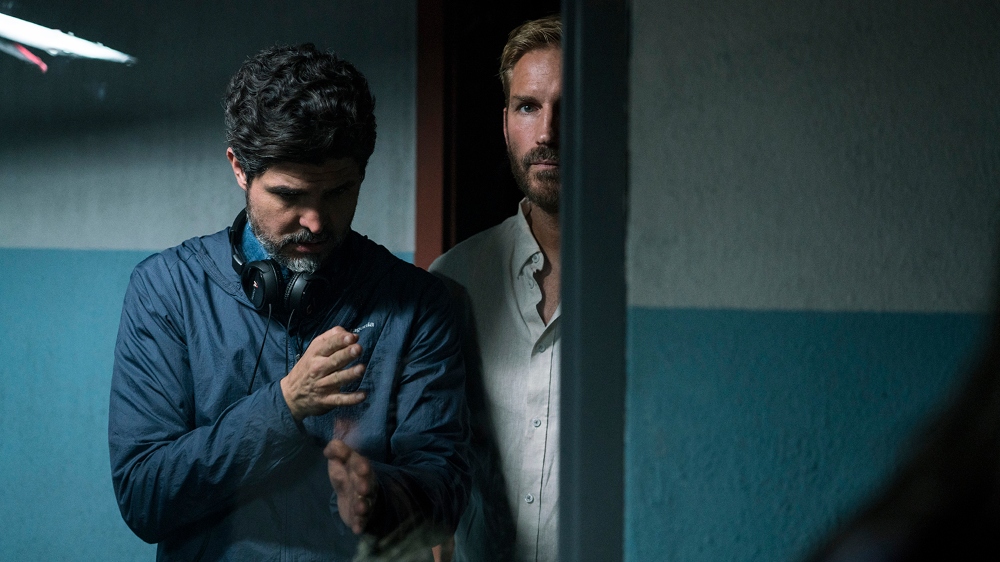
ATL: I understand this movie was made for $14.5 million, so how much of that was crowdfunded, and which platforms did you guys use?
Monteverde: Zero. Completely zero. So, another backstory… we made the movie with Fox International. So we got a letter of MG from them and then we privately funded the film — all of the investors are listed. I don’t want to mention one name, but they’re all big, high-profile investors, and they’re all listed in the movie at the end of the credits. You can see, they’re not little names; they’re very, very powerful names, and you can see how the movie got funded.
So we got funded fully — at that time, I didn’t even know there was an Angel Studios. We shot the movie in 2018, and by 2019, we had a finished film. And that’s when Disney bought Fox, and because we were with Fox International, the movie kind of got lost in limbo. I don’t want to bore you with the details, but we got the movie back, we purchased it [back] somehow, and the movie wound up in limbo.
It was on a shelf because of Covid, and then people thought it was going to be very hard to market because people only wanted to see “happy” movies after Covid, so at one point, I thought, “No one is ever going to see this movie.” At one point, I was like, ‘Well, let’s just go streaming. At least people will see it on streaming.’ As a filmmaker, you want people to see your work. Obviously, you want them to see it on the big screen, but if I had to choose “streaming or not streaming,” I’ll choose streaming, obviously. And that’s [where] we ended up.
But then one day, one of the producers called me and he said, ‘Hey, have you heard about Angel Studios?’ I said ‘No, I haven’t, but I’ll find out,’ and then I found out who they were, and I met with the three brothers, who are three really brilliant minds, and they didn’t [just] tell me, ‘We want to distribute the film,’ they pretty much said, ‘We know how.’
Now, what kind of system do they have? I got to know it a little bit. They have just a little part of crowdfunding for publicity, for PR, or what we call P&A, but it was just a part [of it] because it’s regulated by the government. And what made sense to me was, the best way for this film to work is word-of-mouth, so if you’re part of the film, you’re gonna promote it, and we don’t have the budget that the studios have for marketing — hundreds of millions — we have very little, and the only way for a movie like this [to work] is word of mouth, and that’s what happened — huge word of mouth.
ATL: So those 6400 people who contributed to the crowdfunding campaign only helped raise funds for P&A?
Monteverde: Yeah, for P&A, but only a small part of the P&A because it’s regulated by the government. I don’t know the number, but it’s not much. You’re regulated by the government, how much you can crowdfund it. I don’t know the number but it’s public. You can find it out, and it’s a small amount.
ATL: Do you have a traditional box office agreement with theaters where you’re splitting the box office for this film 50-50 or is it a unique arrangement?
Monteverde: I have no idea, I’m on the filmmaking side of the equation. I know tomorrow I leave for a world tour, and that’s another thing that’s going to be exciting because the conspiracy theory labels happening here do not exist in the world. You go to Mexico, the [term] “faith-based” does not exist, and all the conspiracy names that they use here, they don’t exist there. We’re going to Argentina, Australia, Germany, France, and London — all around — so if we come back with a strong number, then those labels don’t fit, because those labels are American labels, and if come back with a number like that and we actually become an international success as well, then it’s proof of all this mislabeling, and how this movie has been a victim of one of the worst things we can do to humans, [which] is to label each other. And we’re in that culture, which I oppose.
I always reflect and say, ‘I don’t want to label anybody, even the people who don’t like me.’ Like critics, if someone sent me a review that said, ‘This movie looks like a CSI episode,’ I’m like, ‘Really? Okay. Try to make a movie about the most difficult subject matter in a way that the audience can digest it and come out and recommend it.’
But at [some] point, I’m like, ‘Hey, I respect everybody’s points of view, and I’m good with it.’ I’ve come to terms with it. But as long as people do their research, I’m okay with it. There was one journalist they sent me and he said, ‘Hey, did you direct this film?’ and I’m like, ‘I haven’t even seen it.’ So for somebody to misreport on movies I haven’t even seen that they think I directed, it’s like, ‘Wow, this shows how poorly people are actually doing their job.’ You don’t have to like the movie but don’t say I made a movie I haven’t even seen.
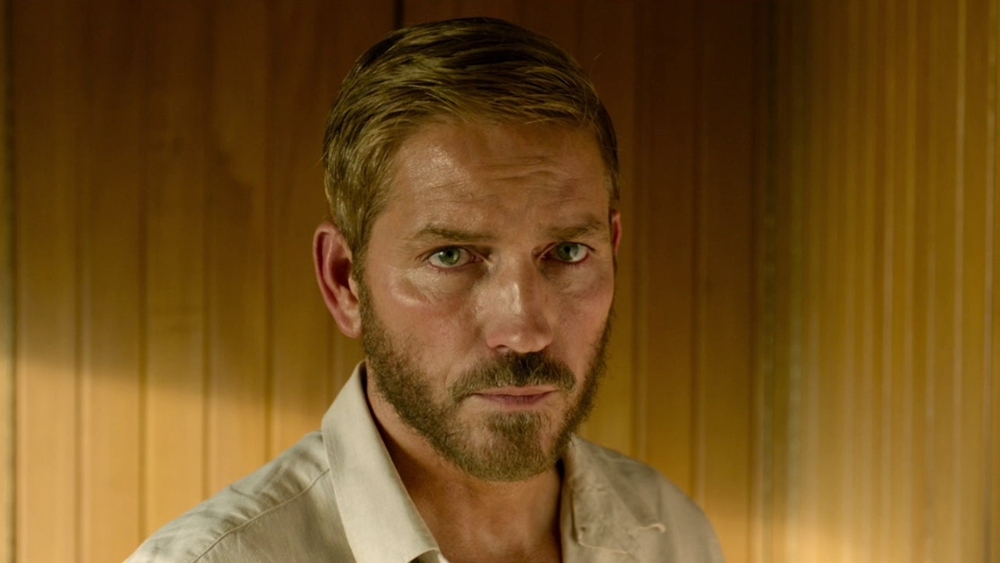
ATL: Do you know how many people have participated in the “Pay It Forward” program advertised by Jim Caviezel at the end of the movie?
Monteverde: No, but they told me it’s less than 10 percent.
ATL: So what would you say to people who think that this is some sort of QAnon movie, whatever that means, or to those who think it’s trying to recruit people into some kind of far-right conspiracy?
Monteverde: Well, I will say one thing, because I am not familiar with it, I always say, “Educate me,” but some people don’t even know what this is, conspiracy groups. Are they a group, like, with members, and how many people are involved, and what are they all about, and so on? So I am very confused because I am a writer/director, so most of the time, I’m writing, so I don’t really have Instagram or anything, so I’m not very familiar with that, I’m familiar with the labeling, but I just put any label, I put it in the same category. I’ve heard all kinds of labels. Conspiracy labels already fall into the category of conspiracy, so why even give attention to that?
The ones I’m more taken aback [by] is a label I’m familiar with, which is faith-based, like, ‘Wow, that one I know and I have no idea why [someone would call Sound of Freedom faith-based].’ Maybe, and I always use this hamburger example, but if you have the best hamburger you’ve ever had in your life, but the bread was made by a Muslim, the meat was made by a Jew, and the waiter who served the hamburger is Catholic. You’re not going to say, “This is a religious burger.” So why the need to label the work if some of the actors are very vocal about their faith? That has nothing to do with the movie.
So I think that was also a product of labeling, just [based on] how outspoken some of the talent in the film is. And the only one that they end up hurting, in the end, is the author. It’s like, hey guys, I wrote it and I directed it, so I’m the author, and I don’t have anything against faith-based films, but it’s not a faith-based film!
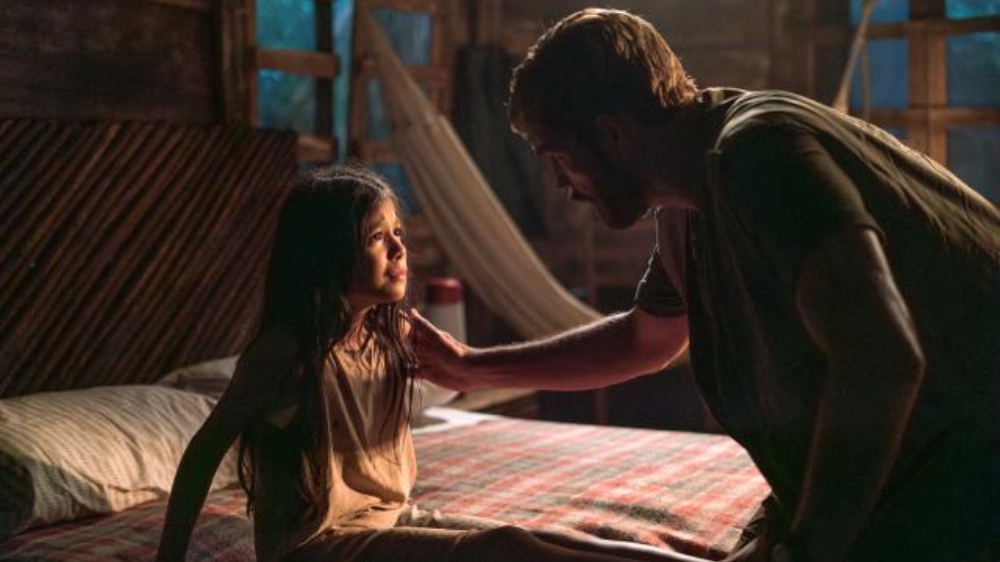
ATL: I agree, I don’t understand those criticisms either. Do you think other indie distributors will adopt the Angel Studios model after the success of this film?
Monteverde: I would think so. It’s like the Broadway approach, you know, or one of them, because the “Pay It Forward” [program] was not as strong as the pre-sales. The pre-sales is that one that, for me, I was like, “Wow. I just went to see Beetlejuice and I bought my ticket, like, two and a half months ago. I’m like, “Why can we not do that for movies?” That’s really interesting. It’s like a Broadway experience.
So that, in itself, I saw, and that was a big tackle to launch the film, and that first chunk of people that went to see it became our walking billboards, what I call our walking billboards because they came out and said, “You’ve gotta go see this movie.” To the point that it came all the way back to me without knowing that I did it. So that was a very impressive job that the Harmon Brothers did.
ATL: Do you think child sex trafficking is a project that’s getting worse or better? Is law enforcement devoting more resources to this problem, or fewer?
Monteverde: Just yesterday, CNN and NBC reported [that] 100 pedophiles were arrested yesterday, and two FBI [agents] were shot. Out of those 100, 78 were in the U.S., and 12 or 13 children were rescued from the production of sexual exploitation and abuse of children, and that just happened yesterday. So I think the awareness is going to help.
Think about this — I have very close family members and friends [who] were molested when they were kids, and they were [close] enough friends of mine to share that. And I said, ‘Well, did you tell your parents?’ And they said ‘Yes, but they didn’t believe me because it was my uncle. And they didn’t believe that my uncle would do that, they thought I was making it up.’
And one big [lesson] about this is that it’s also within the family. I do feel like creating awareness with a film like this, well guess what, next time a child comes to their father or the parent and says, “Hey, my uncle or my cousin wants to see my private parts…’ guess what’s gonna happen? They’re gonna say ‘I believe you because I know it’s happening.’ So it does create awareness, and social awareness creates change, and that’s the only thing I’m proud of.
It’s not [about] this or that, no, it’s [about whether] child trafficking is real or not. That’s the big question, and that’s the one that I propose. I can’t answer it. I don’t know, but I’m proposing the question, “[Does] this exist?” And the research that I did, and looking at the news, it does exist. Well, we should protect the children of the world, and children should not have a nationality, just like whales.
We come together to protect the earth [with] global warming, and we don’t say, save the trees from this particular part of the world. So let’s do the same with children and let’s protect children worldwide. They should become protected as the world’s heritage. It’s like, OK, if you mess with the children in another part of the world, it’s like you’re messing with us, with the whole world. That’s unity.
And that, to me, is what I’m trying to propose [in] this film. Never to impose a thing, but to propose a question. I’m looking for answers so that when people leave the theater, they leave in a state of reflection so that we can create some kind of change.
Sound of Freedom is now playing in theaters nationwide courtesy of Angel Studios.


